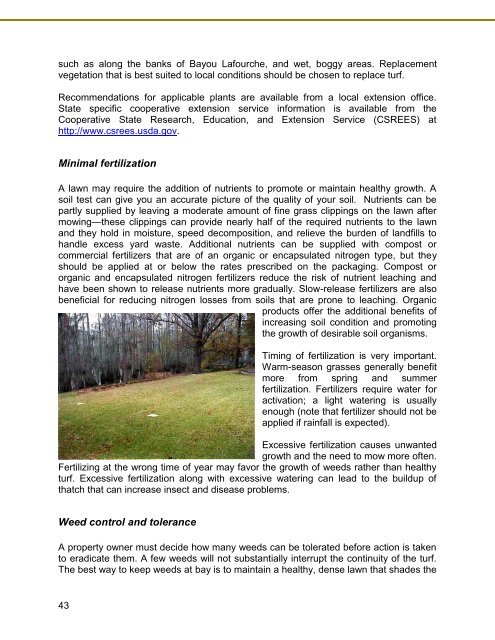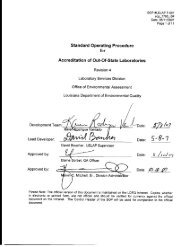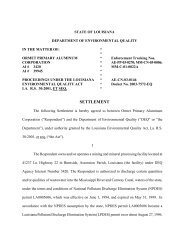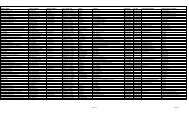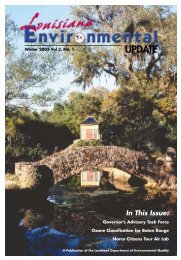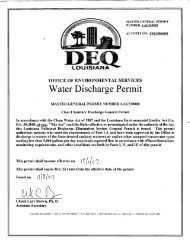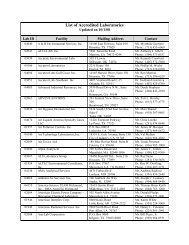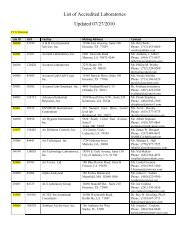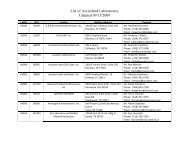Bayou Lafourche
Bayou Lafourche - LDEQ Nonpoint 319 Projects
Bayou Lafourche - LDEQ Nonpoint 319 Projects
- No tags were found...
Create successful ePaper yourself
Turn your PDF publications into a flip-book with our unique Google optimized e-Paper software.
such as along the banks of <strong>Bayou</strong> <strong>Lafourche</strong>, and wet, boggy areas. Replacement<br />
vegetation that is best suited to local conditions should be chosen to replace turf.<br />
Recommendations for applicable plants are available from a local extension office.<br />
State specific cooperative extension service information is available from the<br />
Cooperative State Research, Education, and Extension Service (CSREES) at<br />
http://www.csrees.usda.gov.<br />
Minimal fertilization<br />
A lawn may require the addition of nutrients to promote or maintain healthy growth. A<br />
soil test can give you an accurate picture of the quality of your soil. Nutrients can be<br />
partly supplied by leaving a moderate amount of fine grass clippings on the lawn after<br />
mowing—these clippings can provide nearly half of the required nutrients to the lawn<br />
and they hold in moisture, speed decomposition, and relieve the burden of landfills to<br />
handle excess yard waste. Additional nutrients can be supplied with compost or<br />
commercial fertilizers that are of an organic or encapsulated nitrogen type, but they<br />
should be applied at or below the rates prescribed on the packaging. Compost or<br />
organic and encapsulated nitrogen fertilizers reduce the risk of nutrient leaching and<br />
have been shown to release nutrients more gradually. Slow-release fertilizers are also<br />
beneficial for reducing nitrogen losses from soils that are prone to leaching. Organic<br />
products offer the additional benefits of<br />
increasing soil condition and promoting<br />
the growth of desirable soil organisms.<br />
Timing of fertilization is very important.<br />
Warm-season grasses generally benefit<br />
more from spring and summer<br />
fertilization. Fertilizers require water for<br />
activation; a light watering is usually<br />
enough (note that fertilizer should not be<br />
applied if rainfall is expected).<br />
Excessive fertilization causes unwanted<br />
growth and the need to mow more often.<br />
Fertilizing at the wrong time of year may favor the growth of weeds rather than healthy<br />
turf. Excessive fertilization along with excessive watering can lead to the buildup of<br />
thatch that can increase insect and disease problems.<br />
Weed control and tolerance<br />
A property owner must decide how many weeds can be tolerated before action is taken<br />
to eradicate them. A few weeds will not substantially interrupt the continuity of the turf.<br />
The best way to keep weeds at bay is to maintain a healthy, dense lawn that shades the<br />
43


